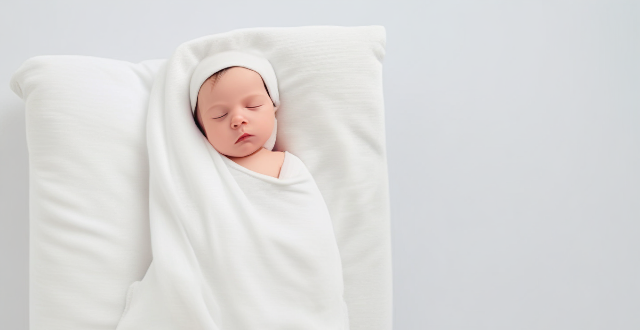Sleep Baby

How do I wean my baby off of nighttime feedings ?
Weaning your baby off of nighttime feedings can be a challenging process, but with patience and consistency, it is possible to achieve. Here are some steps you can follow: 1. Establish a Bedtime Routine: Create a consistent bedtime routine for your baby that includes calming activities such as bath time, reading stories, or singing songs. This will help your baby associate these activities with sleep and make it easier for them to fall asleep without needing a feeding. 2. Gradually Reduce the Number of Nighttime Feedings: Start by reducing the amount of milk or formula you give your baby during each nighttime feeding. Then, gradually decrease the amount over time until your baby no longer needs a feeding at that particular time. 3. Extend the Time Between Feedings: Once your baby is used to receiving less milk or formula during each nighttime feeding, start extending the time between feedings. Gradually increase the time between feedings until your baby is able to sleep through the night without needing a feeding. 4. Comfort Your Baby Without Feeding: When your baby wakes up in the middle of the night, try comforting them without offering a feeding. If your baby is still hungry after a few minutes, offer a small amount of milk or formula to help them fall back asleep. 5. Be Consistent and Patient: Weaning your baby off of nighttime feedings takes time and patience. Stick to your plan and be consistent in your approach. Remember that it may take several weeks or even months for your baby to adjust to sleeping through the night without needing a feeding.

What are the benefits and risks of co-sleeping with your baby ?
Co-sleeping with your baby can promote bonding, ease breastfeeding, regulate sleep, reduce SIDS risk, and encourage restful sleep for parents. However, it also carries risks such as increased SIDS risk in unsafe conditions, chance of rolling over, disrupted sleep for parents, difficulty in establishing independent sleep, and potential for dependency. Safety should be the top priority when considering co-sleeping.

What are the best gifts for a new baby ?
Best Gifts for a New Baby When it comes to choosing the perfect gift for a new baby, there are many options to consider. Here are some of the best gifts for a new baby: - Clothing and Accessories: Onesies, swaddle blankets, hats, and booties are essential for any newborn. Look for ones with cute designs or funny sayings. - Nursery Essentials: A spacious and stylish diaper bag, baby monitor, and rocking chair or glider are must-haves for parents on the go. - Toys and Learning Tools: Plush toys provide comfort and companionship for babies. Board books and musical toys can help stimulate a baby's developing senses and cognitive skills. - Safety and Health Products: A reliable car seat, thermometer, and humidifier are important for ensuring your baby's safety and health.

What are the best practices for infant sleep safety ?
Best practices for infant sleep safety include creating a safe sleep environment, following safe sleep positioning, ensuring proper room conditions, and monitoring your baby's sleep. These practices help minimize the risk of Sudden Infant Death Syndrome (SIDS) and other sleep-related deaths, promoting better quality sleep and overall health for newborns and young children.

What is the ideal age for a woman to start trying for a baby ?
The ideal age for women to start trying for a baby varies depending on individual circumstances, but generally, women in their late 20s and early 30s are considered to be in the optimal age range due to their physical health, emotional readiness, and financial stability.

How can I improve my sleep quality ?
Improving sleep quality involves establishing a bedtime routine, creating a comfortable sleep environment, limiting caffeine and alcohol intake, avoiding electronics before bed, exercising regularly, managing stress levels, and considering natural sleep aids.

How can parents recognize and respond to signs of postpartum depression ?
Recognizing Signs of Postpartum Depression (PPD) is crucial for new mothers to seek help if needed. Common signs include persistent sadness, difficulty bonding with the baby, changes in appetite or sleep patterns, irritability, withdrawal from social activities, and thoughts of harming oneself or the baby. If you notice any of these symptoms, take action by talking to your doctor, seeking support from loved ones, joining a support group, taking care of yourself, and considering professional help. Remember, seeking help is not a sign of weakness; PPD is a real medical condition that requires attention and treatment.

What role does sleep play in managing stress ?
Sleep is crucial in managing stress by regulating hormones, improving cognition, promoting emotional stability, offering physical health benefits, and enhancing quality of life. Prioritizing sleep is key for effective stress management.

What role does sleep play in maintaining personal health ?
The text discusses the importance of sleep in maintaining personal health, including its roles in physical restoration and repair, energy conservation, weight management, memory consolidation, emotional regulation, cognitive function, stress reduction, mood stabilization, and relationship health. Adequate sleep is crucial for overall well-being, and prioritizing it can support physical, mental, and emotional health.

How important is rest and sleep in sports recovery ?
Rest and sleep are crucial components of an athlete's recovery regimen, essential for muscle repair, CNS recharge, and mental clarity. Quality and quantity of sleep directly impact athletic performance through deep sleep phases and REM sleep. Practical tips include creating an optimal sleep environment, developing pre-sleep routines, and maintaining proper nutrition and hydration. Prioritizing rest and sleep is key to achieving peak physical condition and driving overall athletic success.

How does shift work impact sleep patterns, and what can be done about it ?
Shift work can significantly disrupt sleep patterns due to conflicts with the natural circadian rhythm. Strategies for managing sleep disruptions include maintaining a consistent sleep schedule, creating a sleep-friendly environment, avoiding stimulants before bedtime, getting adequate exercise, and seeking professional help if needed.

Is there a specific diet that can help with better sleep ?
Diet plays a crucial role in sleep patterns, with certain foods promoting relaxation and others disrupting sleep. The best foods for better sleep include turkey, milk, bananas, almonds, and chamomile tea, while caffeine, alcohol, spicy foods, sugary snacks, and heavy meals should be avoided before bedtime. Incorporating these dietary changes can help improve the quality of sleep and overall well-being.

Does exercise increase deep sleep ?
Exercise can increase deep sleep by promoting thermal downregulation and improving sleep efficiency over time. Regular exercise is recommended to enhance sleep quality, but timing is crucial to avoid sleep disruption.

How does adequate sleep play a role in women's health ?
Adequate sleep is vital for women's health, affecting immunity, hormone balance, weight management, mental well-being, cardiovascular health, skin condition, chronic disease prevention, and overall quality of life. Prioritizing sleep can lead to fewer sick days, better reproductive health, reduced stress, improved mood and cognitive function, lower risk of heart disease and stroke, delayed aging signs, and a higher quality of life.

How do pets, especially dogs and cats, influence human sleep ?
Pets, particularly dogs and cats, can significantly impact human sleep. They can enhance feelings of safety and comfort, reduce stress and anxiety, and provide social support, leading to better sleep quality. However, they may also cause disruptions during the night, trigger allergies or respiratory issues, and affect temperature regulation, negatively impacting sleep. To manage these effects, pet owners should establish separate sleeping areas, maintain consistent routines, address health issues, consider allergy treatments, and adapt to their pets' needs.

What role does stress play in sleep disturbances and how can it be managed ?
Stress can significantly impact sleep quality by causing difficulty falling asleep, frequent awakenings, light sleep, and early morning awakenings. Managing stress through relaxation techniques, regular exercise, healthy eating habits, a consistent bedtime routine, a comfortable sleep environment, limited screen time, and seeking professional help when needed can improve sleep quality and overall well-being.

Does consistent exercise regulate sleep patterns ?
Consistent exercise has been shown to have a positive impact on sleep patterns, helping regulate the body's internal clock and increase the production of sleep-promoting hormones. Regular physical activity can lead to better sleep quality, reduced stress and anxiety, and improved overall health. To reap these benefits, it's important to incorporate regular exercise into your routine, starting slowly and gradually increasing intensity and duration over time.